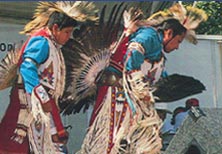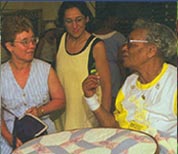| Questions to be Answered |
| What can school-based narratives tell about the communities within your school? |
| What are the different types of school narratives? |
|
- Introduce different types of narratives told at your school, and give an example of one or two of each. Categorize types in various ways—by tellers, e.g., those told by students, teachers, or cafeteria workers; by genre, e.g., tall tales, cautionary tales; or by subject matter, e.g., stories about sports, ghosts, famous students, graduations. Have students add to the list in as many categories as they can. They may tell a whole narrative, or just refer to a story that most people know with a few words or phrases.
- Think about the narratives in the following way: a new student has come to town and wants to know what kind of school he or she will be entering. He or she meets with several students, and they tell these stories. What do you think the new student would think about the school?
- Each student picks one narrative identified in class and collects at least three different versions from different people. What are the similarities and differences between the versions? What accounts for the differences? This part of the lesson can start in class and continue as homework.
- Imagine that it is twenty years from now and your class is having a reunion. What stories do you think will still be told? Think of three and write an imaginary conversation you and two friends might have at the reunion, including the stories.
- Pick a theme and script an imaginary radio program about your school using some of the narratives mentioned in class or collected by you or your classmates. This could take the form of an “exposé” on the school, a call-in talk show, or a news feature. Be creative!
HIGH SCHOOL ADDITIONS: Collect stories about good and bad luck beliefs of members of different sports teams. Do the football players all wear dirty socks to each game for good luck, and what happened when the quarterback forgot to? Do all the members of the girls’ basketball team avoid saying the word “lose” all week before a big game? Write down several of these stories and discuss why these beliefs are important to the team members.
Ask students to solicit their parents’ or older household members’ stories of school.
Pair students with seniors who attended the same school, if possible, or who live in the same part of town. Swap stories about the school “then” and “now.” Or pick a theme for a story swap: tricks we play/used to play on teachers; the most important game the school’s team ever played; the most famous student ever to attend the school. What has changed and what remains the same about school stories over the years? To prompt stories, students and seniors could bring in similar items of school memorabilia: yearbooks or trophies, for instance.
| |
| |
|
Photo |
|
|
|
| |
LESSON 2.3 |
|
| Students cheer their team on at the 1996 State Girls’ Basketball Tournament. Note the student costumes. If a foreigner asked for an explanation of this seemingly strange social ritual behavior, what would you say? |
| |
|
PHOTO BY RACHELL H. SALTZMAN |
|
|









